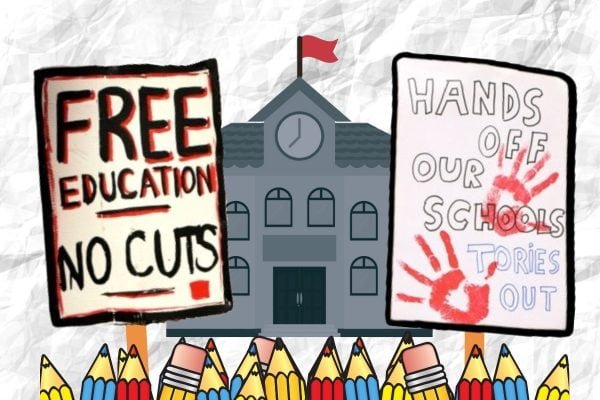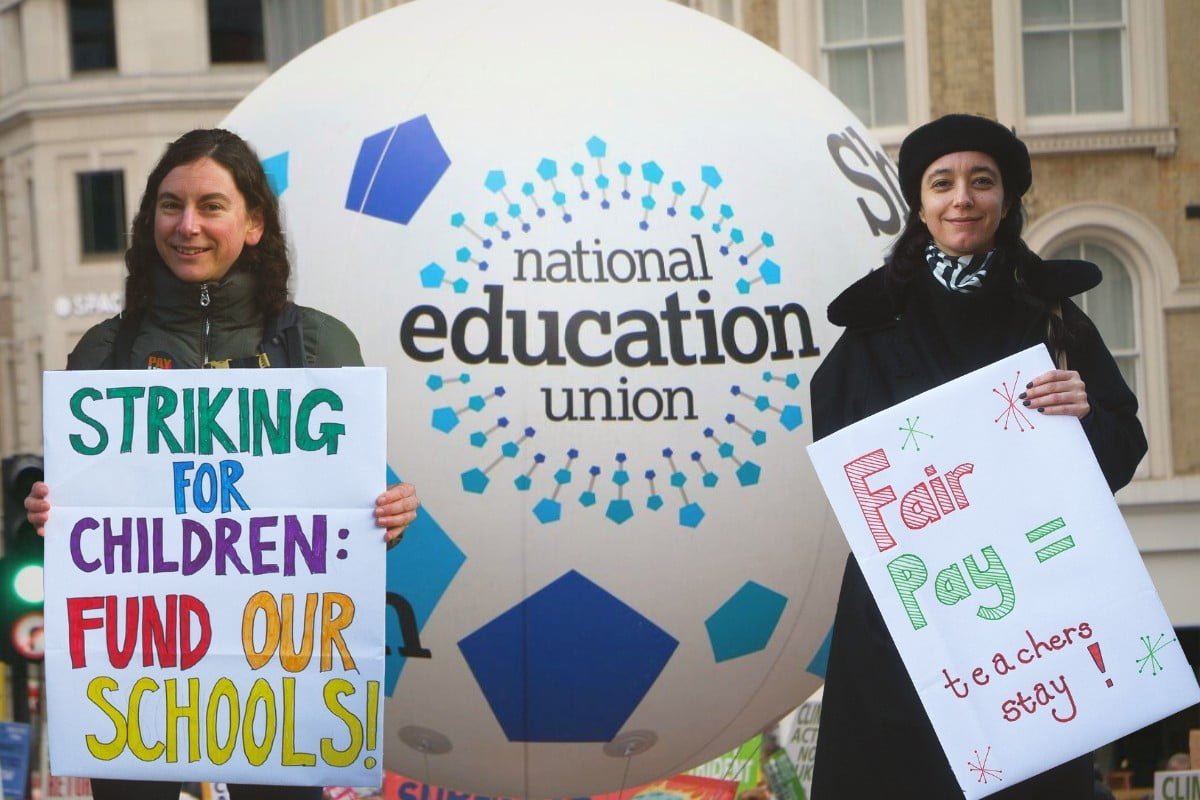A militant mood is clearly evident at the national conference of the National Education Union (NEU) this year, as teachers gather in Harrogate to decide how best to take on the Tories.
The conference opened on Monday with excellent news. NEU members have overwhelmingly voted to reject the government’s miserly pay offer, with 98% saying ‘No’ on a turnout of 66%. This sends a clear message that teachers are not prepared to sell out for crumbs.
This came just as the Association of School and College Leaders (ASCL), representing headteachers and leadership staff, also rejected the same pay offer in a consultative ballot. Altogether, 86% of ASCL members voted against this rotten deal, on a 56% turnout.
Many delegates, in conversation with comrades, indicated their desire to fight. Working day-in, day-out in schools, they can see the ruinous results of Tory austerity, academisation (which a Socialist Appeal NEU activist from Birmingham spoke on from the rostrum), and the creeping factory-line approach to the curriculum.
It is clear that, far from receding, the struggle in primary and secondary education has only just begun.
Comrades of Socialist Appeal are at this years NEU conference! ✊
Following the overwhelming 98% vote to reject the government’s pay offer by NEU members and the announcement of 2 further days of strike action, this conference comes at an important time for the union#NEU2023 pic.twitter.com/5Y3dJbQjaE
— Socialist Appeal (@socialist_app) April 3, 2023
Strategy
Delegates took to the floor this morning (Tuesday), in the first motion of the day, to decide how precisely to tackle the government.
Dealing with the union’s rejection of the latest Tory pay offer, this motion called for two one-day strikes before exam season – but nothing during it. Following this, the strategy would switch to building for the reballot needed in order to continue industrial action. There would also be another three-day strike in late June or early July.
A debate soon emerged over how the union should escalate the struggle. In particular, the main question on everyone’s mind was: should the NEU strike during the exam period?
Those arguing for more militant amendments made the point that, by withdrawing their labour at a critical time for schools, during exam season, teachers would be able to hit the employers where it hurts, and could use the power they hold to its best effect. This would increase the pressure on the government to fold.
Those against this approach, on the other hand, pointed to the worry that this tactic could lead to the loss of public support, and that teachers – understandably – would not want to take action that unnecessarily harmed students.
In the end, the pay deal motion passed unamended. As such, there will be no strikes over the exam period.
Escalation
The arguments made in favour of harder and more militant action were correct. But it is also clear that not enough delegates were won over. This wasn’t helped by the fact that many amendments, which raised good points, were cut from the agenda.

The task ahead, now that this motion has become union policy, is to ensure that we build a proper fightback.
To strengthen the support for action in the upcoming reballot, members must be presented with a proper fighting strategy going into the next academic year, from September.
In particular, NEU leaders must prepare the membership for the serious possibility of escalation – up to and including continuous strike action.
Combined with a series of appeals to other education unions to coordinate action in the new term, this would galvanise members and give them confidence to continue the struggle.
Unity
The ongoing controversy surrounding support staff also raised its head, with revelations that the TUC has ruled against the NEU in a recent hearing.
By balloting support staff members, the TUC deemed that the NEU was, in effect, encouraging those in other unions to switch over, so that they could go on strike.
This astounding ruling – brought about due to petty rivalries between the NEU, GMB, and Unison – highlights how a ‘craft union’ mentality still dominates at the top of some unions. This is to the detriment of ordinary workers, who require unity to win.

While this sorry debate takes place, support staff are being hammered by the same cost-of-living crisis as other workers. And because of this recent ruling, they will not be reballoted alongside teachers. But they cannot afford to wait for these union leaders to get their act together.
Many Unison members have ignored their national union’s instruction, which has been to not cooperate with the NEU locally. This instinctive desire for solidarity and workers’ unity shows the way forward.
To help forge such unity, what is needed is the formation of rank-and-file committees of action in workplaces – such as schools – where several unions are present.
This would cut across these squabbles at the top, encourage maximum involvement by all workers in the struggle, and ensure unity in the face of the employers’ attacks.
Struggles
Ultimately, the struggle in primary and secondary schools is inextricably linked to the struggle faced by the working class as a whole.
This fact was not lost on many delegates, who voiced similar thoughts.
Many of the unheard amendments to the pay deal motion, for example, made explicit reference to the need for the NEU to campaign alongside other education unions.
And while some NHS strikes may be winding down, other sectors – such as local government, under which school support staff are officially categorised – could soon be joining the fray.
Similarly, junior doctors will be continuing their struggle with four more days of walkouts next week, from 11 April, after also rejecting the government’s latest pay offer. And they could be joined by their senior colleagues, also organised in the BMA, who will be balloted over strike action next month.
Socialism
To link these struggles together into one united movement, what is needed is a clear socialist programme, around which a serious fighting campaign involving all unions can be built.

This should include demands to reverse all austerity, academisation, and privatisation; to fully-fund schools and public services, by expropriating the billionaires and bankers; and to put workers and communities – such as staff and students in education – in control.
Such a campaign should include coordinated and continuous action, alongside one-day general strikes and nationwide protests.
Mass, militant action such as this could not only win a genuine pay rise for workers, but could force out this decrepit government entirely. This prospect would electrify millions.
As the strike movement rumbles on, more and more workers will be looking for such solutions. Only on this basis can we truly make education fit for purpose, and ensure the free development of each as part of the free development of all.
Teachers and support staff must take their place in this movement. The NEU has a golden opportunity to set a militant example to the rest of the trade unions. We must seize this moment.






